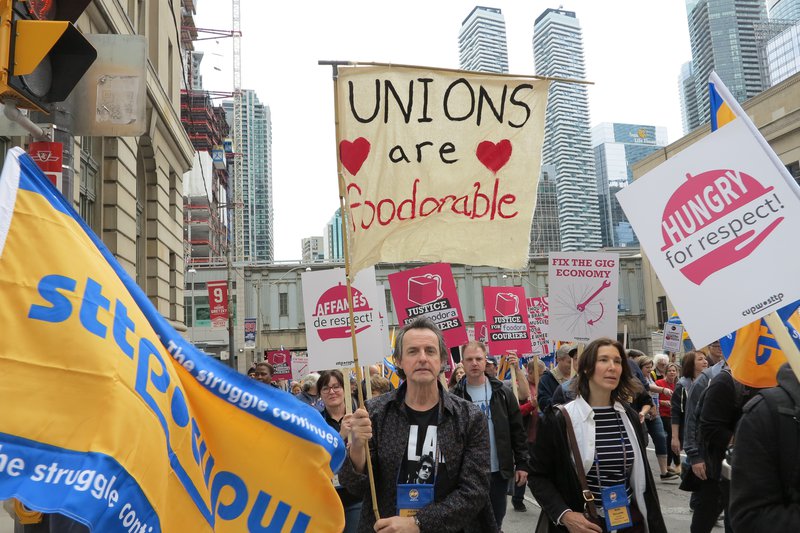This may not be Europe, but to follow attempts at organisation in the gig economy, we thought we would make an exception.
In the fight for unionisation within a precarious gig economy, Toronto Foodora couriers are demanding fairer compensation and protection.
Anna Bianca Roach is a freelance journalist with a focus on the intersection of gender, labour, and migration.
Cross-posted from Open Democracy

Amidst a large crowd, one man in the sea of protest signs brandishes a banner. His tattoo, clearly legible across his forearm, reads: “La lutte continue!” (“The struggle continues!”). It’s the slogan of the Canadian Union of Postal Workers, who took to the streets of Toronto on May 15th in a 650-person solidarity march for couriers working for the app-based delivery service Foodora.
The company’s couriers, recognizable by their friendly fuschia attire, have kick-started one in a wave of movements pushing to unionize workers classified as “independent contractors” under the gig economy.
“I’ve watched my friends in hospital beds, picking themselves off of the road, getting glass out of their wounds, wondering if they’ll be able to make rent having lost a week’s work on the front of a car”, courier Thomas McKechnie told an impassioned crowd during a similar demonstration on May 1st.
“What we want is simple and achievable”, courier Hunter Sanassian explained. “We work in some of the most dangerous conditions in the city. Many of us have been injured on the job. All we want is to be respected as workers and paid fairly by this profitable company.”
Adding insult to injury
“When, not if, we get injured at work, there’s no safety net”, McKechnie asserted. Informal polls reveal that roughly 90% Foodora couriers working for over a year have been injured on the job. When that happens, they are sent to the Work and Safety Insurance Board in Ontario (WSIB) – an organization known for its challenging bureaucracy, late payments, and general unreliability.
Ivan Ostos, a courier leading much of the movement’s media presence, faced difficulties after breaking his arm on shift. “I was doing a nine-hour day. At the end of my shift, I got an injury. I had to go through the WSIB to get some sort of compensation… By the end of that process, I only received $210 (CAD) a week”, he told Ricochet. The company’s priority upon hearing about his injury was whether the delivery could be made in a timely manner.
But injuries and inaccessible medical care aren’t the couriers’ only concern. The payment scheme is elaborate and confusing – seemingly designed to remunerate couriers for as little as possible. Foodora charges the restaurant 30% of the order revenue and the customer $3.99 (CAD) for delivery. From this, drivers are paid a $4.50 (CAD) flat fee and $1 (CAD) per kilometer travelled between the restaurant and the client’s address. Neither the size of the order, nor time spent waiting at the restaurant and driving to the drop-off location factor into their pay.
The pay is not only precariously structured, but unpredictable. “Our pay fluctuates a lot, and we really don’t have any sort of safety net or anything to count on in the way we’re paid”, Ostos told the CBC. Only a select number of couriers deemed “good” by an algorithm can access available shifts for the following week. An hour later, the remaining shifts open up for everyone else. “For the last month or two, that has meant that there were a half-dozen shifts left”, Ostos explained.
Even if you do manage to cobble together enough shifts, there’s still no guarantee there will be enough work. This leaves couriers with an unpredictable source of income – which, combined with the dangers of the job, puts those who rely on couriering for income in a precarious position.
In a statement to openDemocracy, a Foodora representative wrote: “At Foodora, we care about the well-being of our riders, which is why we offer an inclusive WSIB (or provincial equivalent) package and have an open-door policy at our office in Toronto, where our team and fleet supervisor are always there to assist the contractors where we can.”

Old dogs, new tricks
Classifying workers as “independent contractors” allows companies to apply different standards to them than to regular employees. The classification itself is not new. In the United States, tax form 1099 for independent contractors was created back in 1917 – intended for “ad-hoc” hires, such as electricians and plumbers.
More recently, California implemented the ABC test, which defines independent contractors as workers who “perform work that is outside the usual course of the employer’s business.” In Canada, the frequently-used guidelines set out by the Sagaz Industries case phrases it differently: “Whose business is it?” As the name suggests, an integral part of defining independent contract work is whether the worker operates in an independent capacity.
But in the case of Foodora, workers are not providing sporadic, specialized work to fill an unforeseen gap. They are the business model – a model that has been lauded as innovative technology.
According to Will Bloom, a labour lawyer at the Community Activism Law Alliance in Chicago, “the technology is a very small part of what Uber invented. What they really invented was the kind of legal theory of calling all these drivers ‘independent contractors’, and taking a risk that they could basically forestall any legal enforcement until they could move the law in their direction.” Uber, Foodora, Lyft and other similar companies now make up a billion-dollar industry, yet their profit depends entirely on workers they refuse to formally employ.
Some of the criteria used to define independent contractors are often easy to use as excuses to give workers fewer benefits. For instance, independent contractors are expected to file their own taxes. Another example centers around contractors owning their own materials – plumbers, for instance, have their own toolbox. For Foodora workers, this means that they can expect to pay taxes plus an estimated absolute monthly minimum of $200 (CAD) out of pocket (McKechnie specifies that the $200 (CAD) estimate is based on owning a bike, and not a vehicle with more expensive upkeep like a car or electric scooter). The company, which is estimated to be worth around $4 billion (USD), can point to this to support their claim that workers are independent contractors.
Something in the wheels
Unions act as a formal, legally-enforced mechanism for employer-employee relations. Most western countries benefit from a “Right to Strike” act that prevents employers from breaking strikes.
While most corporations try to settle disputes internally, unions provide an incentive to negotiate – and if this fails, they provide legal mechanisms to demand certain rights. Last year in the U.S., around 161,000 teachers went on strike in three different states. In all three states, the workers’ conditions improved as a result of their actions.
However, Foodora couriers and their colleagues at other companies do not enjoy the protections of an officially-recognized union. In fact, as independent contractors, the government might even punish them for striking. Bloom explained that “the Federal Trade Commission could look into them for it”, potentially finding them guilty of violating federal U.S. antitrust law.
In misclassifying workers as independent contractors, these companies are not only skirting the responsibilities they would have to couriers if they were employees – they are also preventing them from protesting their working conditions. In short: app-based drivers must unionize for their labour rights to be recognized, but their labour rights must be recognized in order to unionize.
A union by any other name
“These workers are members of a union right now because these workers are standing together”, CUPW national representative Aaron Spires announced during a May 1st press conference. Just a few days later, on May 8th, Foodora couriers joined the national strike organized in the U.S., which made headlines throughout the country. Like the 2018 teachers’ strike, this strike was illegal: nothing prevented drivers from being ‘deactivated’ (app speak for fired), replaced, or otherwise punished. They’re not standing alone. In the U.S., app-based drivers are backed and supported by a number of different workers’ associations, including the New York Taxi Workers’ Alliance, an unofficial union that has been advocating for cab drivers since the late ‘90s, and the Seattle-based App-Based Drivers’ Association.
They’re also supported by powerful formal unions. In Canada, their struggle is heavily supported by CUPW, who are providing couriers with legal aid, and preparing to take the struggle to the Labour Board if that turns out to be necessary.
The legal framework, though rigid in its writing, may be forced to be more clement than some expect. “The only reason [Foodora] have gotten away with it this far is because no one has challenged them”, said McKechnie. Like others who have been following the unionization of independent contractors closely, he remains optimistic.
The habit of misclassifying workers became rampant with the rise of the tech industry. Between the slow-moving pace of legislation and the utopianism that surrounded the tech industry, the legal loophole at the centre of today’s labour movement didn’t garner much mainstream media attention until now. But legal cases are starting to pile up around the world; Foodora recently lost an important case in Australia, and Uber is facing an uphill battle in a $400 (CAD) million class action lawsuit. They’ve also had important victories in the U.S., like when New York City imposed regulations on the industry in 2018.
McKechnie, Sanassian, Ostos and their colleagues at Foodora exist within a larger wave of workers’ movements. They’ve been mobilizing both within and outside the legal framework. The Foodora couriers have been working with CUPW to fight through the legal route, in addition to building a strong mutual aid community on their own. While the US National Labor Relations Board (NLRB) recently issued a memorandum stating that Uber drivers are contractors, not employees – that ruling is not the end of the road. States and municipalities can extend the same labour rights to independent contractors – a fight that’s been ongoing municipally in Seattle for years.
“Since we’ve had federal labour law, we’ve had big industries excluded from federal labour law”, said Bloom. “There’s a pretty long tradition of folks who organize outside the context of recognized labour unions”, like one particularly successful strike wave in the mid-1930s that led to the creation of the NLRB. That tradition has brought us to where we are today in labour law. As explained by sociologist and author Eric Blanc, legality is a question of the balance of powers at times of great labour militancy – and Foodora couriers moving towards unionisation is nothing less than a sign that we may be getting close to tipping the scales.


Be the first to comment